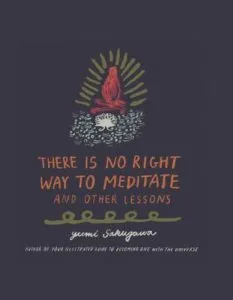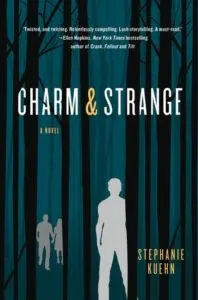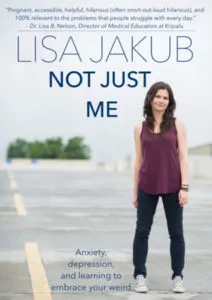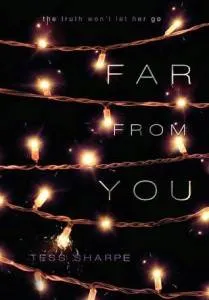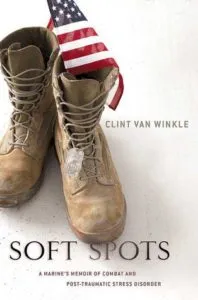
Mental Health Books for World Mental Health Day and Beyond
This content contains affiliate links. When you buy through these links, we may earn an affiliate commission.
Today is the World Health Organization’s official World Mental Health Day. The theme for this year’s day of discussing and highlighting the importance of mental health is that of young people and mental health in a changing world. This is a topic near and dear to my heart, and it’s a topic that’s near and dear to the incredible people who contributed raw, brave, and smart essays and art to my recently-released anthology (Don’t) Call Me Crazy: 33 Voices Start The Conversation About Mental Health.
 The statistics about mental health and adolescents are sobering. Roughly one out of every five teens under the age of 18 struggle with mental illness. Depression accounts for one of the leading illnesses and disabilities in this same age group, and the third leading cause of death in this same demographic is suicide.
But as much as knowing this—and living it, either via one’s memory of youth or by witnessing and working with today’s adolescents—can be scary, there is hope. Culturally, were fostering more open dialog about mental health, and more and more communities throughout the United States are offering resources to their teens via school psychologists and counseling. It’s far from perfect, but these first small steps lead to greater leaps.
Another thing that’s certainly fostering dialog and better understanding is the growth in YA books about mental illness. The more representation of mental health, the more opportunities to see the ways it plays out.
The statistics about mental health and adolescents are sobering. Roughly one out of every five teens under the age of 18 struggle with mental illness. Depression accounts for one of the leading illnesses and disabilities in this same age group, and the third leading cause of death in this same demographic is suicide.
But as much as knowing this—and living it, either via one’s memory of youth or by witnessing and working with today’s adolescents—can be scary, there is hope. Culturally, were fostering more open dialog about mental health, and more and more communities throughout the United States are offering resources to their teens via school psychologists and counseling. It’s far from perfect, but these first small steps lead to greater leaps.
Another thing that’s certainly fostering dialog and better understanding is the growth in YA books about mental illness. The more representation of mental health, the more opportunities to see the ways it plays out.
 In honor of World Mental Health Day, I asked some of the contributors to (Don’t) Call Me Crazy to share some of the books about mental health and mental illness which have had a big impact on their lives. I’ve also included some of the books they’ve written, in order to offer up some excellent reading in the world of mental health. These books are appropriate for teens and adults.
Descriptions from books by contributors come from Goodreads. Descriptions from contributors are their own. If you have any mental health or mental illness books that you find important and powerful, please leave them in the comments. There is always room for more.
In honor of World Mental Health Day, I asked some of the contributors to (Don’t) Call Me Crazy to share some of the books about mental health and mental illness which have had a big impact on their lives. I’ve also included some of the books they’ve written, in order to offer up some excellent reading in the world of mental health. These books are appropriate for teens and adults.
Descriptions from books by contributors come from Goodreads. Descriptions from contributors are their own. If you have any mental health or mental illness books that you find important and powerful, please leave them in the comments. There is always room for more.
 Reasons to Stay Alive by Matt Haig: This right here is hands down the best book about living with depression and anxiety. Bite-sized chapters, lists, and anecdotes make it a perfect book to keep in your back pocket—just in case. —Ashley Holstrom
Reasons to Stay Alive by Matt Haig: This right here is hands down the best book about living with depression and anxiety. Bite-sized chapters, lists, and anecdotes make it a perfect book to keep in your back pocket—just in case. —Ashley Holstrom
When Griffin’s first love and ex-boyfriend, Theo, dies in a drowning accident, his universe implodes. Even though Theo had moved to California for college and started seeing Jackson, Griffin never doubted Theo would come back to him when the time was right. But now, the future he’s been imagining for himself has gone far off course.
To make things worse, the only person who truly understands his heartache is Jackson. But no matter how much they open up to each other, Griffin’s downward spiral continues. He’s losing himself in his obsessive compulsions and destructive choices, and the secrets he’s been keeping are tearing him apart.
If Griffin is ever to rebuild his future, he must first confront his history, every last heartbreaking piece in the puzzle of his life.
 The Beauty That Remains by by Ashley Woodfolk: This book is centrally about the grief of three separate characters, often weaving in their social media presences in this character-driven, voice-y way that I think will particularly engage teen readers. So much of Shay’s experience with panic/anxiety rang true to me, and I particularly appreciated the treatment of therapy in the story, including that therapy/treatment can be especially stigmatized in the Black community. Ashley speaks more about that here. —Emery Lord
The Beauty That Remains by by Ashley Woodfolk: This book is centrally about the grief of three separate characters, often weaving in their social media presences in this character-driven, voice-y way that I think will particularly engage teen readers. So much of Shay’s experience with panic/anxiety rang true to me, and I particularly appreciated the treatment of therapy in the story, including that therapy/treatment can be especially stigmatized in the Black community. Ashley speaks more about that here. —Emery Lord
The Color Of My Mind is a photo essay based on the viral online photo series entitled the “People Of Color and Mental Illness Photo Project” launched in September 2014 by Dior Vargas. The project started as a result of Dior noticing an unfortunate trend in the homogenization and misrepresentation of mental health conditions and the people affected by them. Now, this photo essay seeks to highlight the diversity in the mental health community. The Color Of My Mind visually depicts the experiences of 34 individuals as they discuss their struggles, strengths, and lessons learned while living life as a person of color with a mental illness.
Take a Moment and Breathe!
In There Is No Right Way to Meditate, award-winning artist Yumi Sakugawa helps you tap into your inner self and finally find the peace that you’ve been seeking. Each page offers a unique perspective on how to lead a more mindful life, with captivating ink illustrations and encouraging words like, “it’s okay if the only thing you did today was breathe.” From simple ways to get rid of a bad mood to instructions for making your intentions come true, her lessons will inspire you to become more aware of the present moment and find stillness no matter where you go.
With Yumi’s uplifting guidance, you will dig deeper into your soul to discover the tranquility already surrounding you.
 My Heart and Other Black Holes by by Jasmine Warga follows two teens who make a suicide pact. One of the things this book absolutely nails for me is dark humor. There’s a wry, deadpan line that runs through Aysel’s narration, like glittery black veins through a slab of marble. I not only relate; I found that the levity made the experience of being within a depressed person’s POV much easier. I won’t spoil the end, but I will say that the end felt satisfying without feeling too easy. —Emery Lord
My Heart and Other Black Holes by by Jasmine Warga follows two teens who make a suicide pact. One of the things this book absolutely nails for me is dark humor. There’s a wry, deadpan line that runs through Aysel’s narration, like glittery black veins through a slab of marble. I not only relate; I found that the levity made the experience of being within a depressed person’s POV much easier. I won’t spoil the end, but I will say that the end felt satisfying without feeling too easy. —Emery Lord
When you’ve been kept caged in the dark, it’s impossible to see the forest for the trees. It’s impossible to see anything, really. Not without bars…
Andrew Winston Winters is at war with himself.
He’s part Win, the lonely teenager exiled to a remote Vermont boarding school in the wake of a family tragedy. The guy who shuts all his classmates out, no matter the cost.
He’s part Drew, the angry young boy with violent impulses that control him. The boy who spent a fateful, long-ago summer with his brother and teenage cousins, only to endure a secret so monstrous it led three children to do the unthinkable.
Over the course of one night, while stuck at a party deep in the New England woods, Andrew battles both the pain of his past and the isolation of his present.
Before the sun rises, he’ll either surrender his sanity to the wild darkness inside his mind or make peace with the most elemental of truths—that choosing to live can mean so much more than not dying.
 The Memory of Light by Francisco X. Stork
I’m a huge fan of Francisco X. Stork, who experienced his first serious bout of depression in his teens. While the “waking up in the hospital after a suicide attempt” story has been done a lot of times, it’s done well here, as Vicky and the people around her come to life and are at times pretty funny, dark, and sad as she faces up to the “after” of her failed suicide attempt. —s.e. smith
The Memory of Light by Francisco X. Stork
I’m a huge fan of Francisco X. Stork, who experienced his first serious bout of depression in his teens. While the “waking up in the hospital after a suicide attempt” story has been done a lot of times, it’s done well here, as Vicky and the people around her come to life and are at times pretty funny, dark, and sad as she faces up to the “after” of her failed suicide attempt. —s.e. smith
Lisa Jakub has always been a little weird.
Sensitive. Emotional. Introverted.
What else would you expect from a former child actor turned writer?
But the issue wasn’t just an artistic temperament; Lisa was constantly trying to hide her debilitating anxiety and depression. She assumed that retiring from her eighteen-year acting career and leaving Hollywood was going to be the cure for all of her issues. Guess how that worked out?
Lisa was still having three panic attacks a day and found it hard to leave her house. But when anxiety-induced vomiting claimed the life of her iPod—she knew it was time to get help. It was time to talk about the things that are hard to talk about.
She started to embrace her weird.
In searching for a deeper understanding of mental wellness, Lisa explored her own history and reached out to others to learn how anxiety and depression impacted their lives. She interviewed Veterans with PTSD and ten-year-olds with sensory integration issues, people with eating disorders and cutting habits, those whose lives were saved by medication and those who found yoga to be the answer. She went to Colorado to learn about the effects of cannabis on anxiety, and attended a meditation retreat in North Carolina to sit quietly for hours and hours and hours in “noble silence.” Without a phone.
Not Just Me is a hopeful, entertaining, enlightening look at the root causes of anxiety, the latest research on mood disorders, and ideas for how we can all live authentically with more peace, power, and purpose. Part memoir, part journalistic exploration—this book reminds all of us that we are not alone.
In childhood, Sharpe experienced anxiety, depression, and several suicide attempts, and found her lifeline in young adult fiction. She returned the favor with Far From You, featuring Sophie, who is trying to figure out who killed her best friend after a life turned upside-down by a car accident, a series of painful surgeries, and a dependence that became an addiction—though I do wish to note, as did Sharpe herself when we discussed Sophie’s depiction, that being dependent on pain management (or any medication) isn’t wrong, and questions of addiction and abuse arise when a need (pain control) becomes a want (the psychoactive effects of opiates). —s.e. smith
Marine Sergeant Clint Van Winkle flew to war on Valentine’s Day 2003. His battalion was among the first wave of troops that crossed into Iraq, and his first combat experience was the battle of Nasiriyah, followed by patrols throughout the country, house to house searches, and operations in the dangerous Baghdad slums.
But after two tours of duty, certain images would not leave his memory—a fragmented mental movie of shooting a little girl; of scavenging parts from a destroyed, blood-spattered tank; of obliterating several Iraqi men hidden behind an ancient wall; and of mistakenly stepping on a “soft spot,” the remains of a Marine killed in combat. After his return home, Van Winkle sought help at a Veterans Administration facility, and so began a maddening journey through an indifferent system that promises to care for veterans, but in fact abandons many of them.
From riveting scenes of combat violence, to the gallows humor of soldiers fighting a war that seems to make no sense, to moments of tenderness in a civilian life ravaged by flashbacks, rage, and doubt, “Soft Spots” reveals the mind of a soldier like no other recent memoir of the war that has consumed America.
 In my essay for “(Don’t) Call Me Crazy,” one of my biggest questions is why my mother refused help time and time again after she was diagnosed with schizophrenia. It hurt to know that in many ways, my mother and I were living in different worlds, and she was choosing to stay in the world inside her head. For years, I never understood her choices. But when I started seeing a therapist myself, I wanted to better understand the disorders members of my family had been diagnosed with: schizophrenia, depression, bipolar disorder.
My therapist and I are both avid readers, and I think by having that common ground, she knew where to direct me and my questions. In a way, she was speaking my language. One of the first books she recommended to me was Far From the Tree: Parents, Children and the Search for Identity by Andrew Solomon. The book is geared mostly toward parents who are raising children under various challenging circumstances: In addition to a chapter on raising children with schizophrenia, other chapters introduce readers to children who were conceived in rape, children who are prodigies, children who have autism, and more.
As a sister and as a child of people facing mental illness, I have found it enlightening to read such humane profiles of people who share my family’s diseases. The chapter on schizophrenia, in particular, shows the many facets of a human being battling disease. Solomon writes that sometimes, patients have a hard time “deciding whether [they want] to be in the real world or that other world [in their heads].” One patient, Solomon writes, doesn’t want to stop listening to the voices in his head—over time, they’ve become his friends.
Part of what I’ve found so damaging about the silence around mental illness is that for much of my life, I’ve had to rely on depictions in films and TV to have any sense of what members of my family were going through. For so long, portrayals of mental illness in media were exaggerated and insensitive, and it was incredibly damaging to my ability to understand and empathize with people who were struggling. By reading Solomon’s informative, yet heartfelt profiles, I can start to get a sense of just how complex a person’s life can be—and I can see how a mental health diagnosis is far from a sentence to a life without love. —Hannah Bae
In my essay for “(Don’t) Call Me Crazy,” one of my biggest questions is why my mother refused help time and time again after she was diagnosed with schizophrenia. It hurt to know that in many ways, my mother and I were living in different worlds, and she was choosing to stay in the world inside her head. For years, I never understood her choices. But when I started seeing a therapist myself, I wanted to better understand the disorders members of my family had been diagnosed with: schizophrenia, depression, bipolar disorder.
My therapist and I are both avid readers, and I think by having that common ground, she knew where to direct me and my questions. In a way, she was speaking my language. One of the first books she recommended to me was Far From the Tree: Parents, Children and the Search for Identity by Andrew Solomon. The book is geared mostly toward parents who are raising children under various challenging circumstances: In addition to a chapter on raising children with schizophrenia, other chapters introduce readers to children who were conceived in rape, children who are prodigies, children who have autism, and more.
As a sister and as a child of people facing mental illness, I have found it enlightening to read such humane profiles of people who share my family’s diseases. The chapter on schizophrenia, in particular, shows the many facets of a human being battling disease. Solomon writes that sometimes, patients have a hard time “deciding whether [they want] to be in the real world or that other world [in their heads].” One patient, Solomon writes, doesn’t want to stop listening to the voices in his head—over time, they’ve become his friends.
Part of what I’ve found so damaging about the silence around mental illness is that for much of my life, I’ve had to rely on depictions in films and TV to have any sense of what members of my family were going through. For so long, portrayals of mental illness in media were exaggerated and insensitive, and it was incredibly damaging to my ability to understand and empathize with people who were struggling. By reading Solomon’s informative, yet heartfelt profiles, I can start to get a sense of just how complex a person’s life can be—and I can see how a mental health diagnosis is far from a sentence to a life without love. —Hannah Bae
An intimate, moving book written with the immediacy and directness of one who still struggles with the effects of mental and chronic illness, The Collected Schizophrenias cuts right to the core. Schizophrenia is not a single unifying diagnosis, and Esmé Weijun Wang writes not just to her fellow members of the “collected schizophrenias” but to those who wish to understand it as well. Opening with the journey toward her diagnosis of schizoaffective disorder, Wang discusses the medical community’s own disagreement about labels and procedures for diagnosing those with mental illness, and then follows an arc that examines the manifestations of schizophrenia in her life. In essays that range from using fashion to present as high-functioning to the depths of a rare form of psychosis, and from the failures of the higher education system and the dangers of institutionalization to the complexity of compounding factors such as PTSD and Lyme disease, Wang’s analytical eye, honed as a former lab researcher at Stanford, allows her to balance research with personal narrative. An essay collection of undeniable power, The Collected Schizophrenias dispels misconceptions and provides insight into a condition long misunderstood.
 When I randomly stumbled upon Hyperbole and a Half, back when it only existed as a blogspot site (with an admittedly huge following), I felt like I’d finally found something deeply relatable, not just in terms of foiled attempts at adulting, being weird and
When I randomly stumbled upon Hyperbole and a Half, back when it only existed as a blogspot site (with an admittedly huge following), I felt like I’d finally found something deeply relatable, not just in terms of foiled attempts at adulting, being weird and kind of very awkward, but, importantly, in terms of the day-to-day impact of mental illness. I struggled with self-image issues throughout my teens, which contributed to the anxiety and depression I’ve struggled with all of my adult life. But I, like many others, found it difficult to express what I was going through to family, friends, and therapists; much of my battle was waged in isolation. When I read Hyperbole and a Half, and, specifically, “Adventures in Depression,” I felt seen in a way I never had before. With her simple, effective drawings and sharp, genius satire, Brosh’s comics made me feel less alone, and they gave me much, much needed laughter. —S. Zainab Williams
Want more books about mental health and mental illness? You’ll want to check out these comics about mental illness, 100 must-read books about mental illness, and these great teen books about depression. You may also find these self-help books for depression worth reading.
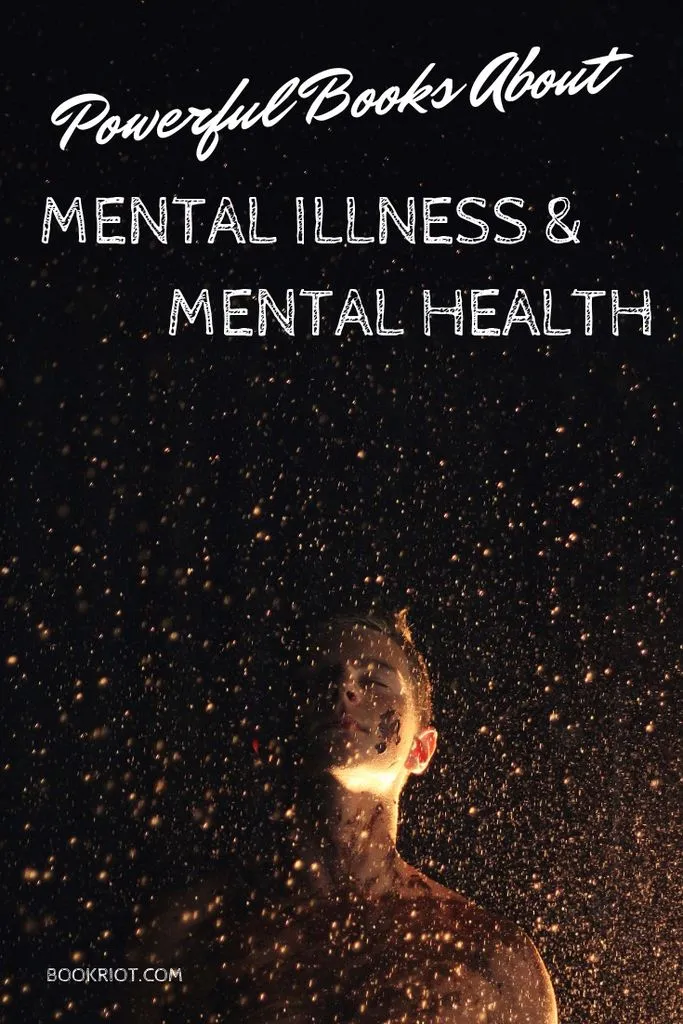 The statistics about mental health and adolescents are sobering. Roughly one out of every five teens under the age of 18 struggle with mental illness. Depression accounts for one of the leading illnesses and disabilities in this same age group, and the third leading cause of death in this same demographic is suicide.
But as much as knowing this—and living it, either via one’s memory of youth or by witnessing and working with today’s adolescents—can be scary, there is hope. Culturally, were fostering more open dialog about mental health, and more and more communities throughout the United States are offering resources to their teens via school psychologists and counseling. It’s far from perfect, but these first small steps lead to greater leaps.
Another thing that’s certainly fostering dialog and better understanding is the growth in YA books about mental illness. The more representation of mental health, the more opportunities to see the ways it plays out.
The statistics about mental health and adolescents are sobering. Roughly one out of every five teens under the age of 18 struggle with mental illness. Depression accounts for one of the leading illnesses and disabilities in this same age group, and the third leading cause of death in this same demographic is suicide.
But as much as knowing this—and living it, either via one’s memory of youth or by witnessing and working with today’s adolescents—can be scary, there is hope. Culturally, were fostering more open dialog about mental health, and more and more communities throughout the United States are offering resources to their teens via school psychologists and counseling. It’s far from perfect, but these first small steps lead to greater leaps.
Another thing that’s certainly fostering dialog and better understanding is the growth in YA books about mental illness. The more representation of mental health, the more opportunities to see the ways it plays out.
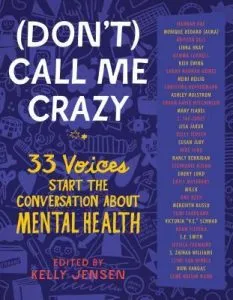 In honor of World Mental Health Day, I asked some of the contributors to (Don’t) Call Me Crazy to share some of the books about mental health and mental illness which have had a big impact on their lives. I’ve also included some of the books they’ve written, in order to offer up some excellent reading in the world of mental health. These books are appropriate for teens and adults.
Descriptions from books by contributors come from Goodreads. Descriptions from contributors are their own. If you have any mental health or mental illness books that you find important and powerful, please leave them in the comments. There is always room for more.
In honor of World Mental Health Day, I asked some of the contributors to (Don’t) Call Me Crazy to share some of the books about mental health and mental illness which have had a big impact on their lives. I’ve also included some of the books they’ve written, in order to offer up some excellent reading in the world of mental health. These books are appropriate for teens and adults.
Descriptions from books by contributors come from Goodreads. Descriptions from contributors are their own. If you have any mental health or mental illness books that you find important and powerful, please leave them in the comments. There is always room for more.
Books About Mental Illness & Mental Health
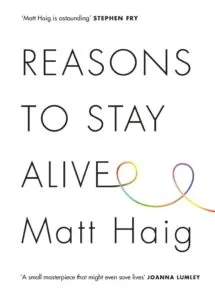 Reasons to Stay Alive by Matt Haig: This right here is hands down the best book about living with depression and anxiety. Bite-sized chapters, lists, and anecdotes make it a perfect book to keep in your back pocket—just in case. —Ashley Holstrom
Reasons to Stay Alive by Matt Haig: This right here is hands down the best book about living with depression and anxiety. Bite-sized chapters, lists, and anecdotes make it a perfect book to keep in your back pocket—just in case. —Ashley Holstrom
 History Is All You Left Me by Adam Silvera
History Is All You Left Me by Adam Silvera
When Griffin’s first love and ex-boyfriend, Theo, dies in a drowning accident, his universe implodes. Even though Theo had moved to California for college and started seeing Jackson, Griffin never doubted Theo would come back to him when the time was right. But now, the future he’s been imagining for himself has gone far off course.
To make things worse, the only person who truly understands his heartache is Jackson. But no matter how much they open up to each other, Griffin’s downward spiral continues. He’s losing himself in his obsessive compulsions and destructive choices, and the secrets he’s been keeping are tearing him apart.
If Griffin is ever to rebuild his future, he must first confront his history, every last heartbreaking piece in the puzzle of his life.
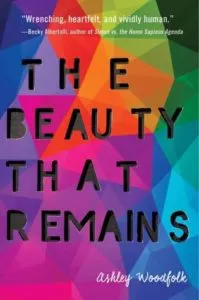 The Beauty That Remains by by Ashley Woodfolk: This book is centrally about the grief of three separate characters, often weaving in their social media presences in this character-driven, voice-y way that I think will particularly engage teen readers. So much of Shay’s experience with panic/anxiety rang true to me, and I particularly appreciated the treatment of therapy in the story, including that therapy/treatment can be especially stigmatized in the Black community. Ashley speaks more about that here. —Emery Lord
The Beauty That Remains by by Ashley Woodfolk: This book is centrally about the grief of three separate characters, often weaving in their social media presences in this character-driven, voice-y way that I think will particularly engage teen readers. So much of Shay’s experience with panic/anxiety rang true to me, and I particularly appreciated the treatment of therapy in the story, including that therapy/treatment can be especially stigmatized in the Black community. Ashley speaks more about that here. —Emery Lord
 The Color of My Mind: Mental Health Narratives from People of Color edited by Dior Vargas (available here)
The Color of My Mind: Mental Health Narratives from People of Color edited by Dior Vargas (available here)
The Color Of My Mind is a photo essay based on the viral online photo series entitled the “People Of Color and Mental Illness Photo Project” launched in September 2014 by Dior Vargas. The project started as a result of Dior noticing an unfortunate trend in the homogenization and misrepresentation of mental health conditions and the people affected by them. Now, this photo essay seeks to highlight the diversity in the mental health community. The Color Of My Mind visually depicts the experiences of 34 individuals as they discuss their struggles, strengths, and lessons learned while living life as a person of color with a mental illness.
 There Is No Right Way To Meditate by Yumi Sakugawa
There Is No Right Way To Meditate by Yumi Sakugawa
Take a Moment and Breathe!
In There Is No Right Way to Meditate, award-winning artist Yumi Sakugawa helps you tap into your inner self and finally find the peace that you’ve been seeking. Each page offers a unique perspective on how to lead a more mindful life, with captivating ink illustrations and encouraging words like, “it’s okay if the only thing you did today was breathe.” From simple ways to get rid of a bad mood to instructions for making your intentions come true, her lessons will inspire you to become more aware of the present moment and find stillness no matter where you go.
With Yumi’s uplifting guidance, you will dig deeper into your soul to discover the tranquility already surrounding you.
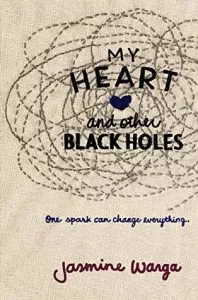 My Heart and Other Black Holes by by Jasmine Warga follows two teens who make a suicide pact. One of the things this book absolutely nails for me is dark humor. There’s a wry, deadpan line that runs through Aysel’s narration, like glittery black veins through a slab of marble. I not only relate; I found that the levity made the experience of being within a depressed person’s POV much easier. I won’t spoil the end, but I will say that the end felt satisfying without feeling too easy. —Emery Lord
My Heart and Other Black Holes by by Jasmine Warga follows two teens who make a suicide pact. One of the things this book absolutely nails for me is dark humor. There’s a wry, deadpan line that runs through Aysel’s narration, like glittery black veins through a slab of marble. I not only relate; I found that the levity made the experience of being within a depressed person’s POV much easier. I won’t spoil the end, but I will say that the end felt satisfying without feeling too easy. —Emery Lord
 Charm and Strange by Stephanie Kuehn
Charm and Strange by Stephanie Kuehn
When you’ve been kept caged in the dark, it’s impossible to see the forest for the trees. It’s impossible to see anything, really. Not without bars…
Andrew Winston Winters is at war with himself.
He’s part Win, the lonely teenager exiled to a remote Vermont boarding school in the wake of a family tragedy. The guy who shuts all his classmates out, no matter the cost.
He’s part Drew, the angry young boy with violent impulses that control him. The boy who spent a fateful, long-ago summer with his brother and teenage cousins, only to endure a secret so monstrous it led three children to do the unthinkable.
Over the course of one night, while stuck at a party deep in the New England woods, Andrew battles both the pain of his past and the isolation of his present.
Before the sun rises, he’ll either surrender his sanity to the wild darkness inside his mind or make peace with the most elemental of truths—that choosing to live can mean so much more than not dying.
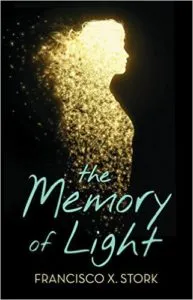 The Memory of Light by Francisco X. Stork
I’m a huge fan of Francisco X. Stork, who experienced his first serious bout of depression in his teens. While the “waking up in the hospital after a suicide attempt” story has been done a lot of times, it’s done well here, as Vicky and the people around her come to life and are at times pretty funny, dark, and sad as she faces up to the “after” of her failed suicide attempt. —s.e. smith
The Memory of Light by Francisco X. Stork
I’m a huge fan of Francisco X. Stork, who experienced his first serious bout of depression in his teens. While the “waking up in the hospital after a suicide attempt” story has been done a lot of times, it’s done well here, as Vicky and the people around her come to life and are at times pretty funny, dark, and sad as she faces up to the “after” of her failed suicide attempt. —s.e. smith
 Not Just Me: Anxiety, Depression, and Learning To Embrace Your Weird by Lisa Jakub
Not Just Me: Anxiety, Depression, and Learning To Embrace Your Weird by Lisa Jakub
Lisa Jakub has always been a little weird.
Sensitive. Emotional. Introverted.
What else would you expect from a former child actor turned writer?
But the issue wasn’t just an artistic temperament; Lisa was constantly trying to hide her debilitating anxiety and depression. She assumed that retiring from her eighteen-year acting career and leaving Hollywood was going to be the cure for all of her issues. Guess how that worked out?
Lisa was still having three panic attacks a day and found it hard to leave her house. But when anxiety-induced vomiting claimed the life of her iPod—she knew it was time to get help. It was time to talk about the things that are hard to talk about.
She started to embrace her weird.
In searching for a deeper understanding of mental wellness, Lisa explored her own history and reached out to others to learn how anxiety and depression impacted their lives. She interviewed Veterans with PTSD and ten-year-olds with sensory integration issues, people with eating disorders and cutting habits, those whose lives were saved by medication and those who found yoga to be the answer. She went to Colorado to learn about the effects of cannabis on anxiety, and attended a meditation retreat in North Carolina to sit quietly for hours and hours and hours in “noble silence.” Without a phone.
Not Just Me is a hopeful, entertaining, enlightening look at the root causes of anxiety, the latest research on mood disorders, and ideas for how we can all live authentically with more peace, power, and purpose. Part memoir, part journalistic exploration—this book reminds all of us that we are not alone.
 Far From You by Tess Sharpe
Far From You by Tess Sharpe
In childhood, Sharpe experienced anxiety, depression, and several suicide attempts, and found her lifeline in young adult fiction. She returned the favor with Far From You, featuring Sophie, who is trying to figure out who killed her best friend after a life turned upside-down by a car accident, a series of painful surgeries, and a dependence that became an addiction—though I do wish to note, as did Sharpe herself when we discussed Sophie’s depiction, that being dependent on pain management (or any medication) isn’t wrong, and questions of addiction and abuse arise when a need (pain control) becomes a want (the psychoactive effects of opiates). —s.e. smith
 Soft Spots: A Marine’s Memoir of Combat and Post-Traumatic Stress Disorder by Clint Van Winkle
Soft Spots: A Marine’s Memoir of Combat and Post-Traumatic Stress Disorder by Clint Van Winkle
Marine Sergeant Clint Van Winkle flew to war on Valentine’s Day 2003. His battalion was among the first wave of troops that crossed into Iraq, and his first combat experience was the battle of Nasiriyah, followed by patrols throughout the country, house to house searches, and operations in the dangerous Baghdad slums.
But after two tours of duty, certain images would not leave his memory—a fragmented mental movie of shooting a little girl; of scavenging parts from a destroyed, blood-spattered tank; of obliterating several Iraqi men hidden behind an ancient wall; and of mistakenly stepping on a “soft spot,” the remains of a Marine killed in combat. After his return home, Van Winkle sought help at a Veterans Administration facility, and so began a maddening journey through an indifferent system that promises to care for veterans, but in fact abandons many of them.
From riveting scenes of combat violence, to the gallows humor of soldiers fighting a war that seems to make no sense, to moments of tenderness in a civilian life ravaged by flashbacks, rage, and doubt, “Soft Spots” reveals the mind of a soldier like no other recent memoir of the war that has consumed America.
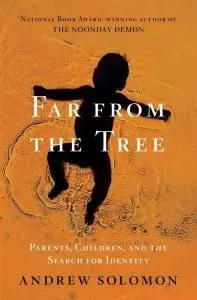 In my essay for “(Don’t) Call Me Crazy,” one of my biggest questions is why my mother refused help time and time again after she was diagnosed with schizophrenia. It hurt to know that in many ways, my mother and I were living in different worlds, and she was choosing to stay in the world inside her head. For years, I never understood her choices. But when I started seeing a therapist myself, I wanted to better understand the disorders members of my family had been diagnosed with: schizophrenia, depression, bipolar disorder.
My therapist and I are both avid readers, and I think by having that common ground, she knew where to direct me and my questions. In a way, she was speaking my language. One of the first books she recommended to me was Far From the Tree: Parents, Children and the Search for Identity by Andrew Solomon. The book is geared mostly toward parents who are raising children under various challenging circumstances: In addition to a chapter on raising children with schizophrenia, other chapters introduce readers to children who were conceived in rape, children who are prodigies, children who have autism, and more.
As a sister and as a child of people facing mental illness, I have found it enlightening to read such humane profiles of people who share my family’s diseases. The chapter on schizophrenia, in particular, shows the many facets of a human being battling disease. Solomon writes that sometimes, patients have a hard time “deciding whether [they want] to be in the real world or that other world [in their heads].” One patient, Solomon writes, doesn’t want to stop listening to the voices in his head—over time, they’ve become his friends.
Part of what I’ve found so damaging about the silence around mental illness is that for much of my life, I’ve had to rely on depictions in films and TV to have any sense of what members of my family were going through. For so long, portrayals of mental illness in media were exaggerated and insensitive, and it was incredibly damaging to my ability to understand and empathize with people who were struggling. By reading Solomon’s informative, yet heartfelt profiles, I can start to get a sense of just how complex a person’s life can be—and I can see how a mental health diagnosis is far from a sentence to a life without love. —Hannah Bae
In my essay for “(Don’t) Call Me Crazy,” one of my biggest questions is why my mother refused help time and time again after she was diagnosed with schizophrenia. It hurt to know that in many ways, my mother and I were living in different worlds, and she was choosing to stay in the world inside her head. For years, I never understood her choices. But when I started seeing a therapist myself, I wanted to better understand the disorders members of my family had been diagnosed with: schizophrenia, depression, bipolar disorder.
My therapist and I are both avid readers, and I think by having that common ground, she knew where to direct me and my questions. In a way, she was speaking my language. One of the first books she recommended to me was Far From the Tree: Parents, Children and the Search for Identity by Andrew Solomon. The book is geared mostly toward parents who are raising children under various challenging circumstances: In addition to a chapter on raising children with schizophrenia, other chapters introduce readers to children who were conceived in rape, children who are prodigies, children who have autism, and more.
As a sister and as a child of people facing mental illness, I have found it enlightening to read such humane profiles of people who share my family’s diseases. The chapter on schizophrenia, in particular, shows the many facets of a human being battling disease. Solomon writes that sometimes, patients have a hard time “deciding whether [they want] to be in the real world or that other world [in their heads].” One patient, Solomon writes, doesn’t want to stop listening to the voices in his head—over time, they’ve become his friends.
Part of what I’ve found so damaging about the silence around mental illness is that for much of my life, I’ve had to rely on depictions in films and TV to have any sense of what members of my family were going through. For so long, portrayals of mental illness in media were exaggerated and insensitive, and it was incredibly damaging to my ability to understand and empathize with people who were struggling. By reading Solomon’s informative, yet heartfelt profiles, I can start to get a sense of just how complex a person’s life can be—and I can see how a mental health diagnosis is far from a sentence to a life without love. —Hannah Bae
 The Collected Schizophrenias by Esmé Weijun Wang (February)
The Collected Schizophrenias by Esmé Weijun Wang (February)
An intimate, moving book written with the immediacy and directness of one who still struggles with the effects of mental and chronic illness, The Collected Schizophrenias cuts right to the core. Schizophrenia is not a single unifying diagnosis, and Esmé Weijun Wang writes not just to her fellow members of the “collected schizophrenias” but to those who wish to understand it as well. Opening with the journey toward her diagnosis of schizoaffective disorder, Wang discusses the medical community’s own disagreement about labels and procedures for diagnosing those with mental illness, and then follows an arc that examines the manifestations of schizophrenia in her life. In essays that range from using fashion to present as high-functioning to the depths of a rare form of psychosis, and from the failures of the higher education system and the dangers of institutionalization to the complexity of compounding factors such as PTSD and Lyme disease, Wang’s analytical eye, honed as a former lab researcher at Stanford, allows her to balance research with personal narrative. An essay collection of undeniable power, The Collected Schizophrenias dispels misconceptions and provides insight into a condition long misunderstood.
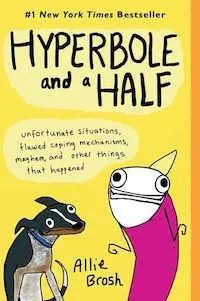 When I randomly stumbled upon Hyperbole and a Half, back when it only existed as a blogspot site (with an admittedly huge following), I felt like I’d finally found something deeply relatable, not just in terms of foiled attempts at adulting, being weird and
When I randomly stumbled upon Hyperbole and a Half, back when it only existed as a blogspot site (with an admittedly huge following), I felt like I’d finally found something deeply relatable, not just in terms of foiled attempts at adulting, being weird and 


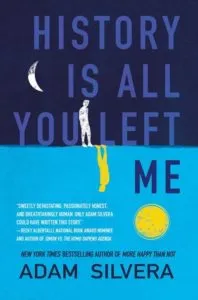
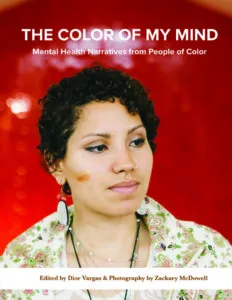 The Color of My Mind: Mental Health Narratives from People of Color edited by Dior Vargas (
The Color of My Mind: Mental Health Narratives from People of Color edited by Dior Vargas (